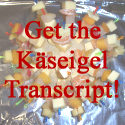Gr√ľndonnerstag
Wednesday, March 25th, 2009Gr√ľndonnerstag is the German name for Maundy Thursday. It is the day before Karfreitag.
On this day, people go to Church to be freed of their sins in order to make a “clean” start for Easter, thus leading to one explanation of the name: the idea is that “green wood” is said to be fresh.
Another reason for the name may be that it is the end of the fasting season, and people used to eat mainly vegetables on this day.
It is a normal working day, although many people do take the day off to go away for a long weekend.
To hear a simple explanation and a short discussion in German, listen to the podcast:
(Press the ‚Äúplay‚ÄĚ button to listen to the podcast)




